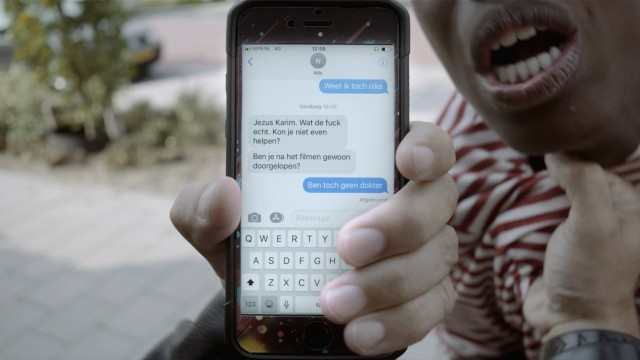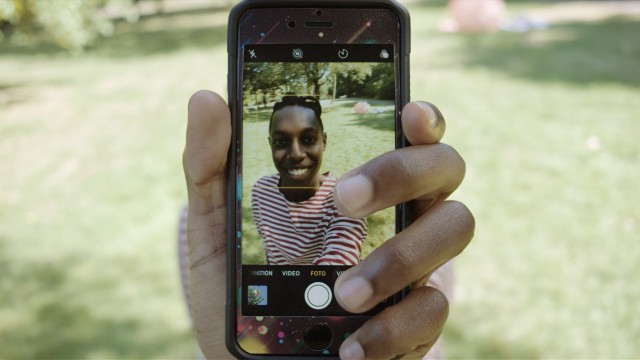With a new take on smartphone addiction and a fresh twist on the screenlife perspective, Martijn Winkler’s #eyewitness immerses its audience in Karim’s eventful afternoon, as he witnesses a crime and inadvertently puts himself in danger. A 13-minute short where the phone is really the main character, we follow the incident and its aftermath through a series of interactions and notifications on Karim’s mobile, as he reviews the footage he shot throughout the afternoon and realises he is holding evidence of the crime in his camera roll.
“I love what I can do with it, but hate who I become when I use it”
Part of a series titled Swipe, #eyewitness is one of seven episodes dealing with the role smartphones play in the daily lives of millennials. A topic most of us can relate to, director Winkler admits having a “love/hate relationship” relationship with his mobile, explaining “I love what I can do with it, but hate who I become when I use it”.
Whether we have it under control or are completely addicted, cellphone usage is a major part of our everyday lives, and its the now commonplace role of these handheld devices that fueled Winkler’s inspiration for the series: “How does real-life interconnect with the virtual life on the phone?”, he asks as we discuss his motivation to tackle these subjects. In #eyewitness that theme is explored in a situation where the phone becomes a key element in a potential investigation.

“Are we in control, or do our devices control us?” – a question Winkler wanted to explore in #eyewitness.
The omnipresence of the phone’s screen is, of course, a realistic way of portraying modern life, but the screenlife angle is hardly a new format. Although it’s not the first screenlife short we can think of, Walter Woodman and Patrick Cederberg’s 2013 film Noah was a groundbreaker in the subgenre at the time and the style of that short has been replicated many times since.
However, the novelty in #eyewitness lies in the fact that the film is not entirely set on the phone’s screen, but instead presented from the perspective of whoever is holding and using Karim’s mobile. The device is always shown front and center, making it the focus of the film and echoing its importance, for many of us, in how we see the world around us.
With the significance of the phone reinforced by having the real environment shown in the background, out of focus, this works to not only install a real point-of-view experience for the audience, but also to highlight how obsessed we can become with our devices. We all know how focused we can be on our screens, leaving the life outside of them just a blurry peripheral vision at times, the novel perspective employed in#eyewitness perfectly captures that “gaze”, while allowing us to get a little distance to appreciate the grasp our phones have on us.

Whilst Karim’s phone is an ever-present through the short, we rarely see his face.
With a central character who is almost never on screen, #eyewitness does an excellent job of generating real empathy for Karim and the predicament he is in. Usually, it is with close-ups that films get their audiences emotionally engaged, but here it is through the sound design that we are taken on the emotional ride, along with Karim.
The visual format of the film provides an organic reason to have real-life sounds, as aurally we’re presented with noises of what is happening around Karim. His breathing, panting at times, combined with his vocal reactions to his IRL interactions with people, creates an immediate intimacy and a sense of real urgency through the film. It all contributes to making this, one of the most realistic on-screen depictions of how we use our phones, I have ever seen. It almost has the same immersive sensation as playing a video game.
“Every move, every swipe and type, was rehearsed extensively”
With Winkler keen to stress that there were “no VFX used in this film”, the question of how they made #eyewitness is almost as interesting as the film itself. With a 4K camera (with huge lens) rigged to a smartphone, each scene is a one-shot take, which may have made the editing process simpler, but on the day of the shoot, everything was meticulously rehearsed.
Describing the process as like choreographing a dance, “every move, every swipe and type, was rehearsed extensively”, the director explains. With several mobile phones operated behind the scenes by a social media team, the production of #eyewitness sounds like a logistical nightmare with no room for errors. I guess that’s the price they had to pay for the extreme authenticity of the film.
Winkler is currently working on two new projects. Writing feature film Headliner, which he describes as a paranoia satire of our media-infused world, whilst also finalizing post-production of a new drama series called Heat – a climate-change thriller.

 Céline Roustan
Céline Roustan